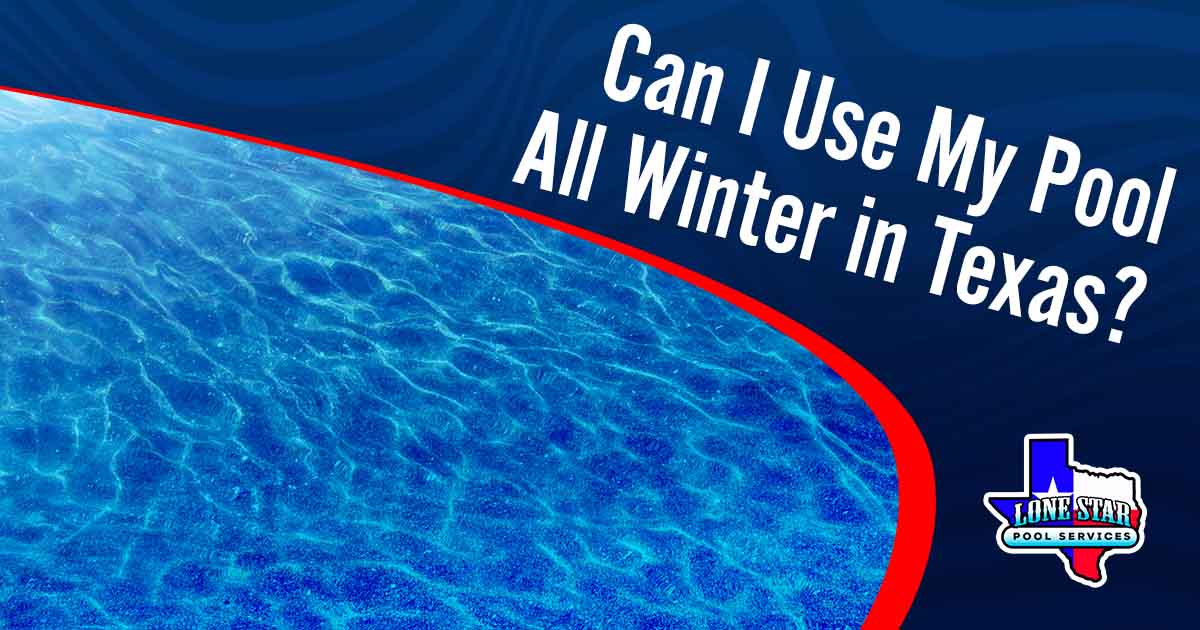But is there another way…?
YES! There’s actually quite a bit of information available. Here’s what you need to know about winter pool maintenance to enjoy your wonderful investment year-round:
Do I really need Winter Pool Maintenance if I live in Texas?
It’s definitely wise to prepare your pool for winter, even when you live somewhere as warm as Texas. Consider it a form of “protecting your investment.”
First off, you must decide what level of winterization you wish to employ regardless of keeping it open or draining it. After all, cooler temperatures or worse, a potential overnight freeze could cost a lot in potential repairs both to the pool equipment and the pool itself. Basic winter pool maintenance will protect your investment, regardless of how open or closed your pool is.
To keep an open pool in winter… or not
Here are several reasons you may want to keep the pool open throughout the winter.
Enjoyment
The sound of flowing water is quite relaxing. Even more so in the winter when there might be snow on the ground.
If you have a powerful enough pool heater, you might risk a dip in the outside air.
Spring Clean Up
Instead of waiting until May to open the pool (and giving the algae plenty of time to grow in the early spring months) leaving it open year-round will significantly reduce the amount of buildup and staining that would occur under normal winterized conditions.
Winter Pool Maintenance
Here are a few of the more basic things to remember if you plan on keeping the pool open for the winter:
The Importance of the Water Line
Keeping a clean water line around the pool is vital to keeping bacteria growth and frost down. The right brush and chemicals are important—more so during the winter months than at any other time since the pool will likely be used much less.
The Importance of Pumps and Vacuums During Winter
If you plan on leaving the pool uncovered, it’s recommended that you keep a weekly brush and vacuum routine. The more trees you have, the more leaves in your yard.
The Importance of Pool Covers
Sheltering your pool even during the coldest temperatures will reduce the amount of debris, insects, and cleanup work for later. A floating solar cover would also be a good alternative if you wish to pull the cover off quickly.
Hiring a Professional Cleaning Service
Our professional staff provide weekly pool maintenance, equipment repair and upgrade, and pool remodels.
Helpful Accessories and Addons
Freeze Sensor
Most pool controller systems have the ability to have a freeze sensor installed. They can be purchased for around $50, a small investment for the peace of mind that they provide. There are two varieties: The common ones use only air temperature sensors, but there is a second kind which also uses a water temperature sensor. Some controllers also feature built-in sensors. Feel free to ask your maintenance person about add-ons and accessories to make your life easier.
Heating Cable
For added protection, you can wrap the exposed above-ground piping with heating cables. While they may not completely protect the pool, they will buy you some time in the event of a pump failure, or simply forgetting to turn the pumps on.
Pond Heaters
While normally nothing to be worried about, the first few surface inches of the pool will likely freeze solid. An alternative is to use a floating pond heater which may mitigate this issue depending on the size of the pool and number of floating heaters.
Other Potential Concerns
Water Features
Water features (waterfalls, deck jets, wall fountains, cascades, etc) should be kept running otherwise the pipes may freeze and potentially burst or damage the valves at the manifold. This also adds an electrical cost for the secondary pump. The other option is to winterize those pipes only, and keep the rest of the system operational.
Power Outage
Imagine it: The absolute worst-case scenario: Mother nature dumps a bunch of snow and the power goes out. Now you have a big problem on your hands. The water in the piping could freeze, damaging valves, impellers, and the pumps themselves. It’s best to drain the pumps and filters, and if possible, winterize the entire pool.
Utility Bills
It can cost a few extra hundred dollars for the continued winter use of the pumps, even though employing slow-speed settings. If the temperatures drop dramatically, the slow-speed settings may turn off, using the full power of the pumps and thus increasing costs further.
Another added cost that a lot of people tend to forget is running a pool heater. Colder temperatures mean more power.
Salt Water Chlorination
Saltwater chlorination systems cease to function below 60 degrees Fahrenheit. Fortunately, algae growth slows significantly below 60 and nearly ceases below 40. While not a big deal, other methods of sanitation may be necessary.

